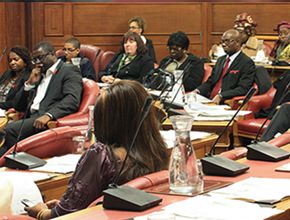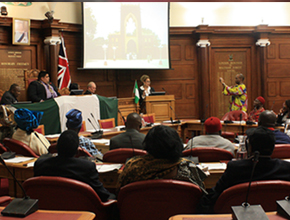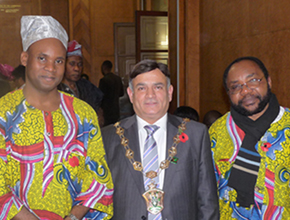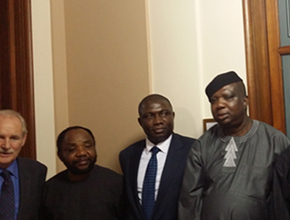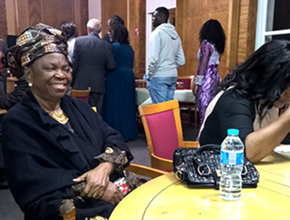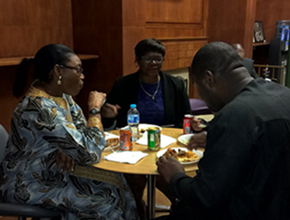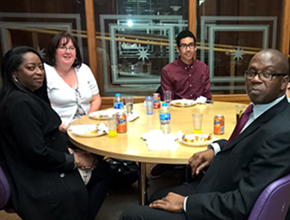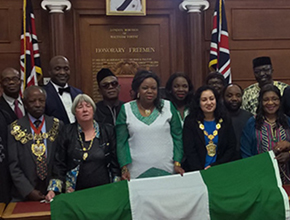Nigeria And Law
The Rule Of Law
What does the Rule of Law mean to Nigerians?
How can Nigeria (1914) forged from Oyo Empire, Benin Empire, Biafran Kingdom, Tiv Kingdom, Bornu-Kanem Empire function as one without rule of law? If Nigeria did not absolve the native law and customs of these people, will it work out well? They are according to Westphalia Treaty floating peoples with no basis for being and purpose of being a nation. Trying to rule them without any basic law arising naturally from them will produce no sound civilization of their hearts. Civilization is not about food or money but environmental equity to accommodate and enable everyone to confirm to law. Anywhere in the world without rule of law leads in anarchy, jungle laws or sub-optimal-false-democracy. Nationalism and Rule of law are inseparable in behavior to produce and checking common outlook and output.
What is the Rule of Law?
From 1648 of European nationalism, there is discipline. A nation is made of people bound by terms and conditions to live together in protection and promotion of lives. Rule of law defines the strength of a nation. It frames up a nation and brings about the transformation of its citizens. And all its manifestations and ramifications, it involves procedures testes and benchmarked the efficacy of the three arms of the government. No law can be made and enforced without the awareness of the citizens who it affects. A nation in which the rule of law is intact, will suffer no breach of its commitment to its core principles: recognition of fundamental human rights and of democratic civil rights and strict observation of the separation of powers. Bad rule of law (arbitrary) strangulates the citizens and demoralises them from making contributions. Practice of law is never hesitant of right and wrong and should be pursued with due diligence and not arbitrarily.
Rule of law is defined in the Oxford English Dictionary as: "The authority and influence of law on the society; especially, when viewed as a constraint on individual and institutional behaviour; the principle whereby all members of a society are considered equally subject to publicly disclosed legal codes and processes". It requires that individuals and government shall submit to and be regulated by law but not arbitrary action by an individual or discretionarily by a group or sections. It requires Impartial Judicial Independence and disciplined Executives of right respect fo the state they represent its arms in functions.
Rule of law instils measures to ensure adherence to the principles of rule of law: equality before the law, accountability to the law, fairness in the application of the law, separation of powers, participation in decision-making, legal certainty, avoidance of arbitrariness. Law is the safeguard of persons, systems, functions and state procedural and mirror of justice. What law does Nigeria practice? Failure to clear and declare this hides solutions. Wherever there is arbitrary law there will be awful outcomes.
Why is the Rule of Law Necessary and How is it Measured?
Let digress a bit; Europe was named in 6BC. Europe warred in its Dark Ages until AD1000. Western European culture, alias Western lifestyle or European Civilization, is a term used widely to refer to a heritage of social norms, ethical values, traditional customs, belief systems, political systems and specific relics and technologies that have some origin. The current European Union began from Coal and Steel Corporation in 1950, metamorphosed to Economic Community of Treaty of Rome 1957 (gradual economisation of Europe) to European Unity of the Amsterdam Treaty 1997 to unite European countries politically in order to secure lasting peace. And in the United Kingdom; the rule of law is one of the fundamental principles of its unwritten or uncodified constitution. The main idea of the rule of law is that the law should apply equally to all governors and governed alike. In this way, the rule of law establishes relationship between government and the people and amongst the people themselves. Thus, the rule of law is the principle that the law should rule in the sense that it applies to all conducts and behaviours and covers both private and public officials. That Nigeria is fifty-ninth year after Independence may seem a length to measure its understanding. However, such understanding does not suddenly produce any wonders amongst hungry and greedy notches. A willing people/nation make sacrifice to sow at one time in order to reap at all times. The level of prejudice in such nation is very low to enable reliable communication and information exchange. The British NHS gathered a lot to support the delivery of quality and equality patient care. People, who are able and willing to serve others submit to law. There are many countries in the world with efficient rule of law and enforcement. The United Kingdom, Germany and Switzerland are where impartiality of law applies to everyone. Any law that starts with looking after life at a national level is bound to do well at national levels. Nigeria is not a qualified rule of law nation. It has deficiencies all over. Operationally for instance, it has more medical doctors than patients and disjointed in management. No efficient management means that there is no way to aggregate and streamline issues and everyone practising medicine, law…at his own discretion. 59 years of national independence is long enough to drop primitive tribal and religious sentiments. Let the good thing happen and let us measure whether anyone discriminates good things. Nigeria looks complex but for its wrong approaches. If it gathers the basic laws from the North, East, West and South, it is possible to transform people’s mentality to have one national focus. Nigeria at the moment is mere political entity. It has nothing else to offer. It urgently needs good constructive transformation to fulfil all requirements. Organisational experts said that good structure facilitates efficient flow of resources. The wealth of a nation is its people but Nigeria succeeds in the North to manage its Northern citizens while others are starved to seek beyond.
When is the Rule of Law Required as a Measure of Belonging?
The law of the people or people’s law is their common mandate. A Constitution of a people is no strange but gathered from them to secure their common practice. Dicey's definition: 'the law of the Constitution, the rules which in foreign countries form part of a constitutional code, are not the source but the consequence of the rights of individuals, as defined and enforced by the courts..., thus the constitution is the result of the ordinary law of the land” The land recalls to mind the basis of law; how id Oyo Empire, Benin Empire, Igbo Kingdom, Tiv Kingdom and Bornu-Kanem Empire make a land of joint law? This is more of European Law. The Nigeria’s Constitution 1999 did not cover or involve the various lands under Nigeria; it is very uncertain. The definitions above void certain national process in Nigeria. The national law is for all and once a section introduced different law, it severs the unity. Thus, the main focus of a nation is to develop it laws to protect and promote all citizens equally but any intervening law destroys the unity. For instance, when the Islamic section mentioned Sharia law made a great impasse. We (Nigerians) studied Law together; thus, it is not that we do not know but that the Islamic world keep silence to whatever is done under Islamic name and this is a great drawback to co-existence.
Rule of law refers to a system or principle of governance in which all persons, institutions and entities, public and private, including the state itself, are accountable to laws that are publicly promulgated, equally enforced and independently adjudicated and which are consistent with international human rights norms. If every individual should abide by the law or a constitution; the law or constitution protects every citizen of the state with inalienable rights and duties to respect each other's rights. The rest of Nigeria warns the Islamic sections to respect the non-Islamic law. Rule of law for the common good shares obligations (protections) and benefits (promotions). National laws are clear, publicized, stable, and just; are applied evenly and protect fundamental rights, including the security of persons and property and certain core human rights. The UK started Nigeria with Parliamentary system but Nigeria bolted to Executive System which has no Exchequer but the Executive President of the nation; Governors of States and the Chairmen of LGAs manage the National, State and LGA budget as their pocket monies.
As citizens we respect the laws because they are clearly communicated and fairly enforced. Everyone is held accountable to the same laws and those laws protect our fundamental rights. The difference between a human and civil right is why you have them. Human rights arise simply by being a human being. Civil rights, on the other hand, arise only by virtue of a legal grant of that right of relationship including social and commercial transactions. Human rights underpin safety, peace and security against oppression
All problems created on earth must be resolved on earth and law establishes standards, maintaining order, resolving disputes and protecting liberties and rights. The law is a guidepost for minimally acceptable behaviour in society between persons, institutions and state.
How far did the Founding Fathers lay a strong foundation for Nigerians? John Adams explained the Founders' understanding when he wrote that good law is good government. The Founding Fathers of Nigeria are like Nigeria without scruples. If the shape (North, West, East, South) of the country pre-occupies us for 59 years, we devolve power to the region to start transformation from the grassroot. This will enable sections (Islamic, Christian….) to remediate to justify its stand. The North is not content without Islam and uses religion to cause friction. It is time to practice true democracy, which brings out the best from the people. Rule of law ensures that no person is untouchable or claims to be above law. It ensures adherence of principles of natural justice like: giving reasonable opportunity, impartiality of decision, etc. It leads to fairness, both substantive and procedural.
The Impact of Colonialism on the Rule of Law in Afrika
What does winning independence and losing the right of governance mean? What did we win? According to Superintendent Ronald Stanley Peters to Mr. Thula Bopela in the Zimbabwean case; we won Black President, Prime Minister; Cabinet, Black MPs/Senators; Judges, Chiefs of Police, Army, whose personal atomisms are naïve and untamed for public duties; who knew nothing of economic leverages of poverty on which stability depends? According to Superintendent Peters, the British planned the Africa they took over from the natives; they kept Afrikans at arms-length (Indirect Rule) such that Africans shall never be in position to rule his newly found country without taking his cue from Britain. Thus, Britain should continue to rule after Political independence by remote control. They cleverly changed the country they took from the natives to a country, they will find many years later when they gained political independence to be totally unlike the country their ancestors lived; it will be a new country without its natural customs nor properly constitute rule of law. In Nigeria, Britain made enroute from Eko (1845) to Bight of Benin to Bight of Biafra (1901). Britain made enroute to the North from 1885 with Indirect Rule (arms-length) and ruled them differently. Then came 1906, the West (Yoruba) and Benin were merged. In 1908, the East and the West were made Southern Protectorates and in 1911, the amalgamation of the Northern Protectorate and Southern Protectorate were fixed with sound reasons (See the Future of Nigeria) to make the rule of law move from sections/tribes to the centre and back to the sections. But in 1914, the WW1 broke out. After the war, recuperation took precedence to the required training to make Nigeria work out well. The same happened after the WW11 and totally, Nigeria lacked discipline to operate rule of law. It was the WW1 and WW11 that brought about the current state of Nigeria as what was planned was different from what was implemented. Now, we found a nation that is not binding to the traditional/customary or religious laws nor to the rule of law. Do you agree with tribal, inimical and religious prejudices that Nigeria deserve Executive President, Governor…, who manage the country’s treasure as his pocket money? We were to plead force Maguire to the plan but the military dictators found it and implement a part of it in 1991. Thus, the democrats who follow after them must to restore the rule of law by implementing the full plan of 1911 that laid the fathomable tie for Nigeria. To elect a national President is a joyful thing but in the 2019 Presidential and Governorship elections, more than five hundred people (including International Observers) were killed; this is not rule of rule but thuggery.
In 1948 Dr. Miller Walker asked: Have we failed in Nigeria? Then, in the face of Arthur Richard’s Constitution, it was not answered. It moved to John Macpherson and to unmannered but conflicting independence in 1960. Thenceforth to difficult elections of 1964 that ended in 1965 and led to the first coup. These unruly conducts; the subsequent eight coups destroyed any hope of the rule of law. The civilian regimes that came after military were not disciplined to instil or establish rule of law. How long more do we wait for the full implementation of the plan of 1911 that fixed on to Nigeria? Anyhow delayed, we must admit the truth that that founding plan or no Nigeria. Nigeria started with Parliamentary and switched to presidential and must know the characteristics of Presidential system. It is not only money but also efficient management of the national resources including human resources and only rule of law transforms to make success possible.
